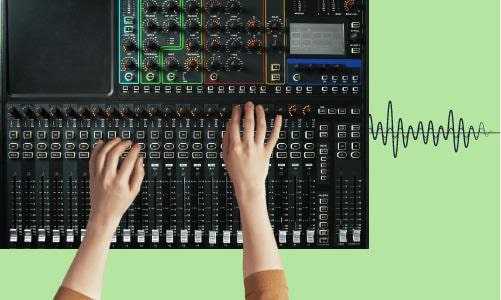Contents
Of your course.
module 1
Diploma in Sound Engineering
+
-
And then there was sound: The history of sound recording
The wonderful world of sound
Lesson 3: What do all the numbers mean?
This lesson will introduce you to reading meters, time and tempo in DAW's.
Music Theory for Sound Engineers
In Lesson 3 we will introduce you to pitch, timbre, musical notes, how to build chords, midi, velocity as well as learn how to use music theory to compose a basic 4 bar chord loop, bass line and melody.
Real vs Digital Acoustics
In lesson 5 you will how to use reverb and delay as an effect, as well as sound propagation and the addition of spacial elements in a recording.
The secret to beautiful recordings
Introduction into the mechanics of microphone design and function, noise levels, polarity and how to record a voice.
Clean it up
Learn how to identify and reduce noise and masking frequency bands. Also gain an understanding of the tools that are available and how to apply them.
Feel the pressure
Introduction into dynamic control through applying basic compression techniques.
module 2
Intermediate in Sound Engineering
+
-
Get it right every time
Intermediate composing, arrangement and mixing. Apply all skills from lessons 1-8.
Make some noise
Learn how the different acoustic and electric instruments produce sound and how to approach them in a recording session.
Music Theory for sound engineers and producers (Part B)
Learn how to use major and minor 7th chords and accompanying baselines.
Can you hear it?
Listening training to identify different frequency bands. A crucial skill for any sound or music enthusiast!
Beat it!
Apply intermediate musical principles to compose an eight bar sequence of music.
How low can you go?
Learn the influence of bass on a mix, how to control the dynamics of kick and bass and how to balance the low-end in a mix.
Polish your track
Learn the use and application of time based processing.
Housekeeping
Learn and revise best industry practices regarding workflow, arrangement and mixing.
module 3
Advanced in Sound Engineering
+
-
Advanced Acoustics
Learn the fundamentals of sound proofing, improving room acoustics and designing a professional studio.
Microphone Pairs and Placements
To gain an understanding of microphone pairs and its applications.
Pitch and Time Correction
Manipulate transients, pitch and timbre to improve time and pitch properties of recordings.
Mic and record
Learn best practices for microphone placement to record loud sounds like drums, saxophone and other impacts.
Music Theory for sound engineers and producers (Part C)
Learn the importance of voice leading, counter melody lines and when to use it.
Audio burgers: Stacking layers
Understand matching different timbres and instruments to achieve aesthetic compositional goals.
The movies aren't real! (Part A)
An introduction into recording dialogue and dialogue replacement for film.
The movies aren't real! (Part B) Make your own
How, when and where to add sound effects to video and how to make your own.
module 4
Proficient in Sound Engineering
+
-
Sound is everywhere
An introduction into surround panning and mixing.
Advanced Music Theory and composition
Learn advanced musical nuances and techniques to emphasise emotive music.
Understanding loudness
Differentiate between true peak, rms, integrated and momentary loudness.
Introduction into mastering
Understand the differences in approach when mixing compared to mastering.
Balancing the mix: EQ
Learn how to apply equalisation in mastering.
Learn to listen: Compression
Learn how to apply compression in mastering and achieve a target integrated loudness.
Put a cap on it: Limiting
Learn how to apply limiting to achieve a target integrated loudness and deliver your promo video in its final format.
Mastering insights
A deep look at noise profiles created by different software limiters, formats and compression techniques used by audio engineers and streaming services.





